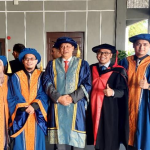The Relationship Dimension of Habl min al-Nas - Environment - N atural Resources
Habl min al-nas with the environment is one of the second components of Islam. This dimension of relationship refers to the human relationship with the environment which is the source of nature. With the availability of natural resources, goods and services can be produced to meet human needs and want. Allah SWT has provided mankind with abundant and abundant natural resources and following the standard set by Allah SWT for every human being. Natural resources provided by Allah SWT for human life in the world are part of the abundant provision of Allah SWT (Ibn Kathir, 2011; al-Tabariy, 2009).
According to Qutb (1987) and al-Jaza'iriy (1986), the position of Allah SWT as the Provider of this One is the continuation of Allah SWT as the Creator and Owner of the One Being of all beings. In this regard, al-Tabariy (2009) says that Allah SWT gives sustenance to all living beings on this earth. All that provision is protected by His command. Al-Tuwajiri (2000) also offered the same view as al-Tabariy (2009), adding that Allah SWT will not kill a person unless he has fulfilled his pre-determined provision.
Taken as a set, Salleh (2003) stated that Allah SWT has provided sustenance for each of His creatures. However, the sustenance received by the creature in the form of raw materials or consumer end-products is not mutually exclusive in terms of quantity. Allah SWT says:
“And if God had provided the sustenance of every one of his servants, they would have gone beyond the limits of the earth; but Allah decreed (His provision) at the rate as He pleased. Indeed, He knows all the affairs of His servants, and sees them clearly ”(Al-Syura, 42:27).
According to Qutb (1987), this verse illustrates how much provision God SWT provides for human life in this world, but in reality, it is few. Even more so when compared to the abundance of grace in the hereafter.
If Allah SWT extends its provision to mankind as much as possible in the hereafter, they will act beyond the limits and commit unjust acts. Humans are weak creatures and cannot afford to be rich except for themselves. Allah SWT knows and sees the attitude and behaviour of His servants. Therefore, Allah SWT makes provision for this earth to be limited to certain rates that only human beings can bear. His abundant gift of grace was kept as a reward for those who passed the test in the hereafter. Therefore, even with these few natural resources, human has felt it enough that they have forgotten the Creator and Owner of this world, let alone that Allah SWT bestows more on this earth. Consequently, one may find in the contemporary society where rich folks bought luxury cars to skip the payment of zakat and somewhat this is relatively known as zakat evasion.
Although the wealth of natural resources is readily available and freely available, it cannot be used in a wasteful way and beyond the limits of life's necessities. To ensure that natural resources are becoming more and more abundant, the level of consumption based on basic needs and convenience should be taken into account. This will never be achieved if the level of consumption is based on unlimited will that leads to heart and soul damage, spiritual and physical imbalance and waste. The method of using natural resources in Islam advocates that natural resources should not be used excessively or wastefully, leading to waste (al-Furqan, 25:67 & al-An'am, 6: 141). This is also explained in the Hadith of the Prophet (SAW) which means:
“Narrated by 'Amru bin Syu'ayb r.a. from his father from his grandfather that the Messenger of Allah (may peace be upon him) said: Eat, drink, give alms, and dress with no pride, no arrogance and no excess (waste). Indeed, Allah loves to see the effect of His favour upon His servants. "(Narrated by Ahmad bin Hanbal, Hadith No. 6669, al-Syaybaniy, 1994: 379).
Based on the above Qur'anic verses, Ibn Kathir (2011) describes that Allah SWT prohibits human beings from being extravagant in giving or spending. Allah SWT also prohibits human beings from thinking about their families so that their needs are not being met. Al-Qurtubiy (1993b) and al-Tabariy (2009) argue that the word al-israf in both verses carries the meaning of khata (wrong) which is wrong in terms of the use of the property and therefore waste. Likewise, Ibn Kathir (2011) states the descend of the verse in al-Anʻam (6: 141) due to the events that occurred against Thabit bin Qays bin Syammas. He cuts down his palm, saying:
"No one came to me today except I fed him." Ibn Kathir (2011).
Then Thabit fed until the evening until all his limbs were gone. So Allah SWT revealed this verse. Al-Tabariy (2009) says that although the verse in this chapter is derived from the events that happened to Thabit bin Qays bin Syammas, the prohibition of waste in general. This means that Allah SWT prohibits humans from making waste in any form. For instance, one who buys more than one car to show off and nothing to do to commute to the workplace. Such an act is forbidden Islamically.
In the context of natural resources, from Islam and how Islam is organized is very broad and unlimited. Consciousness exists only in physical terms and quantities ( Qur'an , 42:27). The resources of this world are guaranteed to everyone based on the provisions set by Allah SWT. The Qur’an states that Allah SWT has provided everything that man needs to live. According to Kuran (1992) and Nazeer (1981), although natural resources are vast and unlimited, the use of Muslims in these natural resources should be within the guidelines of Islamic teaching. Nazeer (1981) argues that if the decision to use an individual is guided by Islamic norms, then natural resources are far more sufficient for humans. In other words, it is not possible to have a natural resource if humans obey the rules set by Allah SWT regarding its use. This is in line with the word of Allah SWT:
"O Apostles, eat of the good and lawful things and do good deeds; Indeed, I know well what you do. ”(al-Mu'minun, 23:51).
"O you who believe, eat of the good things which We have given you, and be grateful to Allah if you worship Him only." (Al-Baqarah, 2: 172).
The above Quranic verses explain the rules regarding the use of natural resources which are halal and good food. Although this rule is limited to good and lawful food, it can be extended to the use of other natural resources. This is in line with the Hadith of the Prophet (SAW) which means:
“Narrated from Abu Hurairah r.a. that the Allah’s Messenger (may peace be upon him) said: O people! Allah is good. He doesn't accept anything but good things.
Verily, Allah commanded the believers as He commanded His Apostles. So Allah SWT says:
"O Apostles, eat of the good and lawful things and do good deeds; Indeed, I know well what you do ”(al-Mu'minun, 23:51).
His word again:
"O ye who believe, eat of the good things We have given you, and be thankful to Allah if you worship Him only" (al-Baqarah, 2: 172).
Next, the Messenger of Allah (SAW) spoke of a man who had travelled a long way, his hair tangled with dust, his two hands stretched out to heaven in prayer:
“Oh my God! Oh my God! While the food is illegal, the drink is illegal, the clothing is illegal, it is supplied with illegal substances, so how can its prayers be answered” (Muslim, 1015 & al-Tirmidhi, 3174).
The above Hadith describes the need for Muslims to eat clean, pure and sourced foods from halal sources. There are at least two implications of this Hadith. First, a healthy and clean diet has a direct connection with a blessing and can bring one closer to Allah SWT. Secondly, food that is illegal and impure does not bring the blessing of a person away from Allah SWT. Therefore, the use of natural resources is limited to what is lawful and good. The command to eat halal and sacred food in this verse of the Qur’an and the Hadith also intends to utilize all-natural resources to the best of its ability and not exceed the limits of its use.
3. Conclusion
This study provides an Islamic perspective of unlimited human wants by considering Islamic worldview in explaining Muslims’ consumption and spending. If one’s want is driven by lust and satanic influences, the trend of consumption and spending are somewhat extravagant at the expense of society at large, implying the benefits are earned by the hands of few instead of many. If one’s want is driven by piety, the consumption and spending are worked with Shariah principles to balance his well-being with others. Following al-Faruqi (1981), one who has high level of faith tends to consider others in his personal consumption for that he is influenced to perform charitable givings, these include the voluntary ones (i.e. sadaqah and waqf ) and positive ones (i.e. zakat and faraid ).
Importantly, the whole discussion can be summarised in four things. First, people with weak faith will have an unlimited will, while high-faith people will be able to control their appetite to remain at the level that Allah SWT sees. Second, the better the lust and the higher the lust level, the lower and the level of usefulness. Likewise, the worse and lower the level of lust, the higher and beyond the limits of usefulness. Third, Islam accepts the needs and wants of human beings in a variety of stages and stages from the dawn to the tahsiniyyat . However, Islam does not advocate the use of luxury goods and services beyond the limits of tahsiniyyat and beyond the limits. Fourth, the natural resources created by Allah SWT for human use are vast and unlimited, but they cannot be used in any way beyond their limits. Instead, people must adhere to the ethics and rules of use established by Allah SWT.










